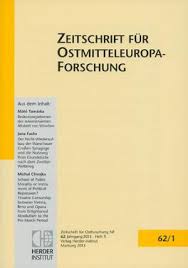Geschichte der Pariser Exilzeitschrift Kultura (1947-2000). Forschungsstand und Forschungsdesiderata
The history of the emigre Journal Kultura in Paris. Current State of research and desiderata
Author(s): Bernard WiadernySubject(s): Cultural history, Communication studies, Post-War period (1950 - 1989), Migration Studies
Published by: Verlag Herder-Institut
Keywords: history; Journal Kultura; Paris; Current state of research;
Summary/Abstract: As illustrated here, research into the Kultura circle started in the late 1980s, initiated by the circle itself, and often also controlled by it. One of the most crucial issues to be explored is the source material, which is hard to survey and, moreover, complicated by the fact that the publisher's archives have not yet been completely inventoried. There is a broad consensus among historians that Kultura's aim was to change the Polish national identity and that it pursued political goals. Among these, primarily, were the regaining of Poland's independence and the consolidation of its outward immunity, especially in East Central Europe. The history of the Journal is a success story, not only programmatically, but also economically. It is all the more astonishing that little attention has been paid to this latter aspect. To date, the circulation of this most important Polish post-war Journal has only been roughly established. Almost nothing is known about the distribution of subscribers in particular countries world-wide, nor about the exact number of issues delivered to Poland illegally or the number of books published. The Journal's standing in West European cultural life, especially in the 1950s and 1960s, when there were close contacts to the Journals of the congress for cultural freedom, such as Preuves and Der Monat, also needs to be explored. The central research issue, however, is the Journal's impact in Poland and East Central Europe, respectively. It cannot be overlooked that the Statements made in this context so far lack an empirical basis. This, and a strikingly doubtful theoretical foundation are the essential weaknesses of Polish research into Kultura. Some approaches, such as comparative history and studies focussing on transfer or the perception of certain groups like generations, though, could be applied successfully in the future when examining the history of the Journal and its leading protagonists.
Journal: Zeitschrift für Ostmitteleuropa-Forschung
- Issue Year: 57/2008
- Issue No: 2
- Page Range: 187-297
- Page Count: 51
- Language: German

